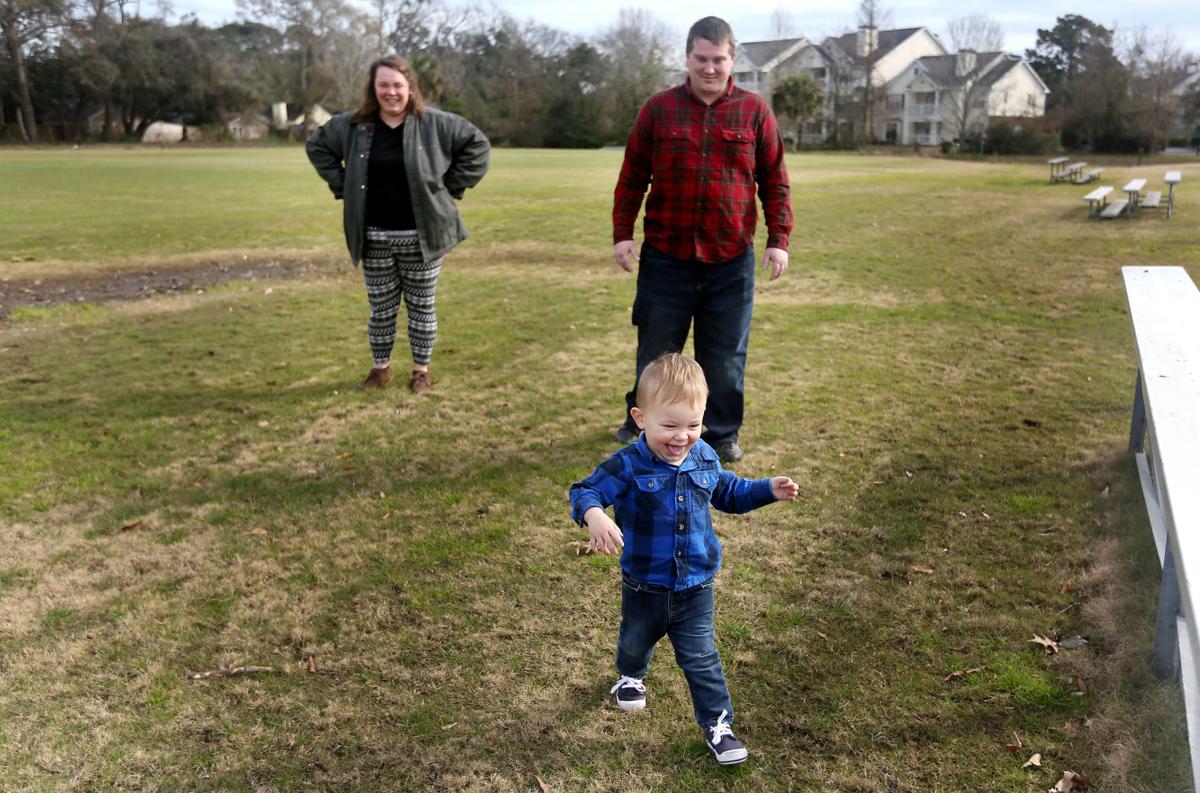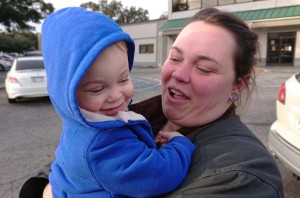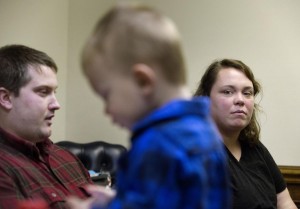
Watching young Foxx Coker pad around his Johns Island home, clutching his favorite toy dog and dancing to the theme of SpongeBob SquarePants, his parents can’t help but think of all the little moments like this they have missed over the past two years.
His first steps. His first words. His first taste of solid food. Moments forever lost amid a swirl of accusations and heartache.
Foxx was just 2 months old when the state Department of Social Services whisked him away in May 2017 after a variety of broken bones in his body led to suspicions of child abuse. Then, a judge unexpectedly returned him to his parents Wednesday after a medical expert testified that the boy’s injuries resulted from a bone-weakening case of nutritional rickets, not physical abuse.
Now the blond-haired toddler is home, scattering his toys about the house, high-fiving people with his tiny hands and scurrying along after his parents on walks to a pond on the rural, 12-acre property where they live.
He’s already spent more time with them than he has since he was placed in protective custody and shuttled through a series of foster homes. During that time, his parents were allowed to see Foxx for two hours each month in a DSS facility while case workers watched from behind two-way mirrors.
“He knew who we were,” said his father Joshua Coker. “But there is no way you can truly bond with someone in two hours a month.”
That’s just 24 hours in a year, he said. The equivalent of a single day.
They would watch as the foster parents’ car pulled away with Foxx inside after each visit. It was like the moment he’d been stripped from them was being played on an endless loop, his mother, Ashley Joyner, said.
“It’s been awful,” she said, shaking her head. “An absolute nightmare.”
Coker and Joyner say they are thrilled to have Foxx home again, savoring every moment and trying to concentrate on a brighter future that suddenly lies ahead of them. As they fought efforts to terminate their parental rights in Charleston County Family Court, they weren’t expecting to walk out the door with Foxx the same week. They figured they would be ordered into a treatment plan replete with parenting classes, drug testing and other hurdles to prove their competence.
Instead, Judge Michele Forsythe blasted DSS for failing to back up allegations of abuse with solid evidence, the family’s attorneys said. She ordered DSS to return Foxx to his parents immediately and provide the family with a year’s counseling to help with their reunification.
“We’re parents again,” Joyner said. “And we’re going to raise the best little boy we can.”
Not everyone shares the family’s joy. Critics of the judge’s decision and skeptics of the rickets diagnosis have expressed outrage over the ruling and the speed with which Foxx was returned to his parents. Rumors have swirled over what’s in the child’s medical records as others point to two misdemeanor assault convictions in the father’s past, the most recent of which was in 2013.
State Rep. Nancy Mace, a Daniel Island Republican, said the system failed in one way or another. Either the boy was improperly taken from his family at a tender age or the judge erred in sending him back into what could be a precarious situation. Either way, someone should be held accountable, she said.
“This is a miscarriage of justice on one side or the other,” she said.
Concerning injuries
The family’s long journey started, Joyner said, when she discovered her infant’s son left leg was swollen one day, though without signs of obvious bruising. They ended up at Medical University Hospital, where doctors informed them that Foxx had a leg fracture. The medical staff didn’t mention at the time that X-rays had pinpointed several other fractures as well. But soon, DSS investigators arrived on the scene and began questioning Joyner and Coker about the injuries, the couple said.
They were caught off guard by the sudden scrutiny but were confident, they said, that authorities would realize their suspicions were misplaced. That didn’t happen. Foxx was soon placed in protective custody.
A few weeks later, Charleston County sheriff’s deputies moved in to arrest the couple on suspicion of child abuse after testing failed to pinpoint a medical condition that could have caused the injuries and doctors pointed to signs of possible trauma, according to arrest affidavits.
After news of the arrests broke, the couple received death threats over social media, Coker said. Joyner said anger, depression and stress set in, and she grew uncomfortable even venturing out to the grocery store. Foxx had been their “miracle baby,” as Joyner, 27, had a medical condition that doctors said would prevent her from having a child. How could people think they would harm him, they wondered.
Still, they remained convinced that authorities would realize at some point they had made a mistake, they said.
“Obviously, it was going to be tough no matter what, but we just had to get the truth out there,” Coker said. “And I was confident that one way or another, no matter how long it took, he would be coming home.”
Their attorneys said they cooperated with authorities in every way they could. They took and passed polygraph tests, and they asked to testify in court even though it meant waving their 5th Amendment protections with criminal charges still looming, said John Duffy, an attorney for Joyner.
Coker, a 29-year-old cook, said he didn’t mind the scrutiny or questions about his past criminal record, which he chalked up to bad decisions as a young man. “I’m not the same person I was back then,” he said.
Another explanation
Their luck changed after their attorneys found a California orthopedic surgeon who agreed to review Foxx’s X-rays. The doctor, an expert in bone disorders, concluded with certainty that Foxx’s 16 fractures were caused by rickets brought on by a vitamin D deficiency, Abigail Duffy, an attorney for Joyner, said.
Nutritional rickets, according to the Centers for Disease Control and Prevention, has been considered rare in the U.S. since the introduction of vitamin D-fortified milk and infant formula. But the disease has seen a rise in occurrences in the past several decades, according to recent research by the Mayo Clinic. If a mother breastfeeds her child and does not give formula or supplement the milk with vitamin D, rickets can develop in the first month or two of life, experts said.
Joyner said she breastfed Foxx but used a soy supplement with little vitamin D because her son had trouble digesting standard formula.
The couple’s attorneys contend that MUSC waited too long to test Foxx for vitamin D deficiency, which led to a misdiagnosis of his injuries, and DSS was unwilling to entertain explanations other than abuse.
“The villains in this case are Charleston County DSS and MUSC,” William H. Nixon Jr., an attorney for Joyner, said in an email to lawmakers and The Post and Courier. “They utterly and completely failed to handle this case properly.”
DSS and MUSC have declined to discuss specifics of the case, citing privacy laws.
Ryan Schwartz, an attorney for Coker, said he hopes this case leads to reforms in how DSS handles cases, and makes pediatricians think carefully before concluding that something is child abuse.
“Just because it looks like something doesn’t mean it is,” Coker said. “All avenues need to be examined before you come to a conclusion.”
“Also, people make mistakes,” Joyner said.
Coker nodded. “Even doctors.”
For now, Joyner and Cox are concentrating on the future, not what’s been lost. They plan to throw a big party for Foxx on his birthday in early March. And holidays this year will be extra special events.
“You are going to be very spoiled this year,” Coker told his son with a laugh.
Gregory Yee contributed to this article.


